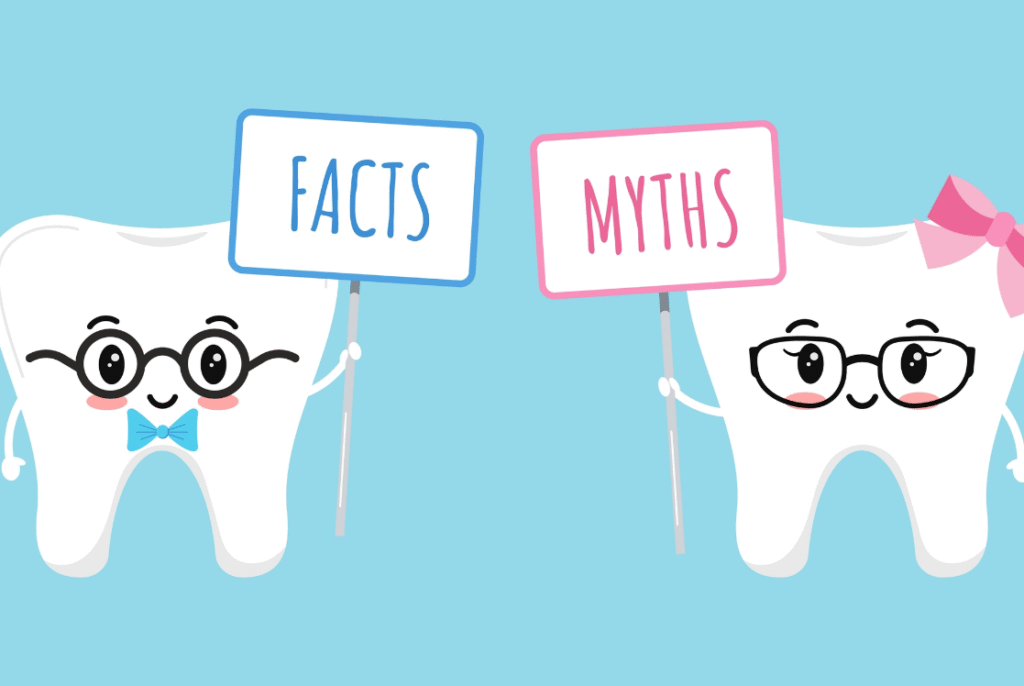Best Dental Clinic In Bangalore Indiranagar | Best Dentist in Bangalore Indiranagar
Home » Blog » General dentistry » The Truth About Teeth Whitening: Myths vs. Facts
The Truth About Teeth Whitening: Myths vs. Facts

A bright, white smile is often associated with beauty, health, and confidence. With the growing popularity of teeth whitening treatments—both professional and over-the-counter—it’s no surprise that the internet is filled with claims, opinions, and unfortunately, misinformation. So, what’s fact and what’s fiction?
Let’s uncover the truth about teeth whitening by busting common myths and explaining what really works.
Myth 1: Whitening Damages Your Enamel
Facts: Professional teeth whitening treatments are formulated to be safe when administered correctly. Whitening agents like hydrogen peroxide or carbamide peroxide break down stains without harming the tooth’s structure. However, overusing DIY or unregulated products can cause sensitivity or enamel erosion. Always consult your dentist before starting any whitening treatment.
Myth 2: All Whitening Products Work the Same
Facts: Not all whitening products are created equal. Over-the-counter toothpaste or strips may help with surface stains but are usually less effective than professional treatments. In-clinic whitening penetrates deeper to remove stubborn discoloration and offers more noticeable, longer-lasting results.
Myth 3: Whitening Works on All Types of Teeth
Facts: Whitening treatments are most effective on natural teeth. If you have crowns, veneers, or fillings, those won’t respond to whitening agents. Also, teeth discolored due to internal factors (like trauma or medications) may not lighten significantly. Your dentist can help determine the right approach.
Myth 4: You Only Need to Whiten Once
Facts: Teeth whitening isn’t permanent. Depending on your habits (like coffee, tea, wine, or smoking), stains can return over time. Most people need touch-ups every 6–12 months to maintain their results.
Myth 5: DIY Remedies Like Baking Soda or Lemon Work Safely
Facts: While baking soda and lemon are often touted as natural whiteners, they can harm your enamel. Acidic or abrasive substances may lead to sensitivity, gum irritation, and long-term damage. It’s best to use dentist-approved products.
Tips for Safe and Effective Teeth Whitening
- Always consult a dentist before starting any whitening treatment.
- Use whitening toothpaste as a maintenance tool, not a primary solution.
- Professional in-office treatments provide the safest and fastest results.
- Avoid tobacco and reduce staining beverages like coffee and red wine.
- Use a straw when drinking dark liquids to limit tooth contact.
FAQs About Teeth Whitening
Q1: Is teeth whitening safe for sensitive teeth?
Yes, but your dentist may recommend a lower concentration of whitening gel or special desensitizing agents to minimize discomfort.
Q2: How long do results from teeth whitening last?
Typically, 6 months to 2 years—depending on lifestyle, diet, and oral hygiene habits.
Q3: Can teenagers get their teeth whitened?
It’s generally recommended for individuals above 16, with a dentist’s supervision.
Q4: What are the side effects of whitening?
Temporary tooth sensitivity and gum irritation are the most common but usually subside within a few days.
Teeth whitening can be a safe, effective way to enhance your smile—if done right. Don’t fall for common myths or quick fixes. Instead, rely on expert guidance and scientifically-backed treatments for results that are both dazzling and damage-free.
